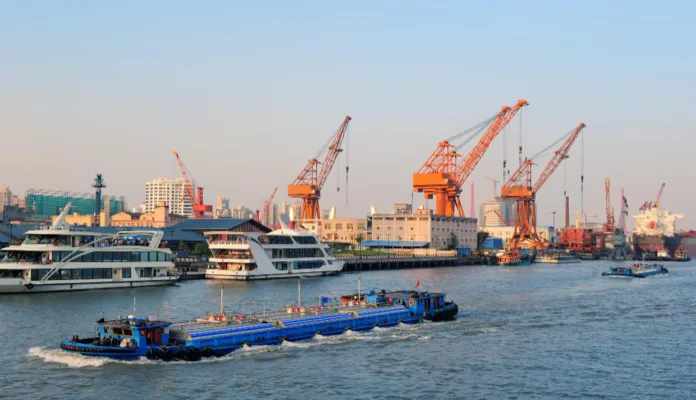Driven by chemicals and plastics, Saudi Arabia’s non-oil exports hit SR25.38 billion in July as part of the kingdom’s Vision 2030 economic reforms
In July 2024, Saudi Arabia witnessed a significant boost in its non-oil exports, which grew by 19.04 per cent year-on-year to reach SR25.38 billion ($6.76 billion), according to data released by the General Authority for Statistics (GASTAT). The surge highlights the success of Saudi Arabia’s efforts to diversify its economy away from oil, a cornerstone of its Vision 2030 plan.
Chemical and allied products led the growth, accounting for 25.8 per cent of total non-oil exports, marking a 1.3 per cent increase compared to the same period last year. Plastics and rubber products also played a key role, making up 25.6 per cent of exports, with a notable 6.5 per cent rise. The performance of these sectors underscores the Kingdom’s growing strength in manufacturing and industrial exports.
Saudi Arabia’s main non-oil trade partners in July were the UAE, China, and India. The UAE was the top destination, importing SR4.46 billion worth of goods. China and India followed, receiving SR2.66 billion and SR1.74 billion, respectively. Other key markets included Bahrain, Turkey, and Singapore, which collectively accounted for significant portions of Saudi non-oil exports.
Embed from Getty ImagesDespite the impressive growth in non-oil sectors, Saudi Arabia’s overall merchandise exports increased by a modest 2 per cent in July, reflecting a 3.1 per cent dip in oil exports. This marks a continued reduction in the contribution of oil to total exports, which fell to 73.1 per cent in July, compared to 77 per cent a year earlier. The shift underscores the Kingdom’s commitment to reducing its dependency on oil revenues.
Meanwhile, Saudi imports surged by 12.6 per cent in July, totalling SR75.22 billion. The increase in imports led to a 25.4 per cent decrease in the trade surplus. China remained Saudi Arabia’s largest import partner, contributing SR19.10 billion in goods, followed by the US, Germany, and the UAE.
Analysis
Political: Saudi Arabia’s increasing non-oil exports are a critical component of the country’s Vision 2030 reforms, which aim to modernize its economy and reduce its dependency on oil. By developing its chemical, plastics, and rubber sectors, the Kingdom is shifting its focus from a traditional oil-dependent economy to one driven by industrial exports. This economic shift is closely tied to Saudi Arabia’s geopolitical strategy, as the Kingdom seeks to position itself as a regional leader in manufacturing and trade. The diversification effort enhances Saudi Arabia’s global influence and improves economic resilience against oil market fluctuations.
Social: Saudi Arabia’s emphasis on non-oil exports reflects broader social reforms under Vision 2030. The growth in these sectors has created new employment opportunities, particularly for young Saudis, in manufacturing and industrial roles. The move away from an oil-reliant economy also aligns with the government’s goal to encourage innovation and entrepreneurship among its population. Additionally, as industries like chemicals and plastics expand, they contribute to the broader social changes taking place, from increasing women’s participation in the workforce to developing new urban infrastructure and housing projects.
Racial: While the diversification of Saudi Arabia’s economy through non-oil exports is primarily an economic issue, it also has racial implications within the country. The expansion of industrial sectors has led to the recruitment of both local and foreign labor. Saudi Arabia’s foreign workforce has traditionally been composed of workers from Asia, Africa, and the Middle East. As the Kingdom continues to grow its manufacturing and export industries, it is crucial to ensure that racial disparities in wages, working conditions, and employment opportunities are addressed. The government has made efforts to improve labor rights for expatriate workers, but disparities still exist.
Gender: The rise in non-oil exports in Saudi Arabia is playing a role in advancing gender equality in the workforce. The Kingdom has seen increasing participation of women in economic sectors that were previously male-dominated, including manufacturing and exports. Vision 2030 promotes women’s economic empowerment as a key goal, and the diversification of industries beyond oil provides new opportunities for women to enter the labor market in leadership and technical roles. However, challenges remain, as women’s full integration into these industries will require sustained efforts to address social and cultural barriers.
Economic: From an economic perspective, the rise in non-oil exports is a positive indicator of Saudi Arabia’s progress toward achieving its Vision 2030 goals. The increase in exports of chemicals, plastics, and rubber products shows that the country’s industrial sector is becoming a major contributor to the national economy. This diversification reduces the Kingdom’s vulnerability to oil price shocks and global energy market volatility. The decision to shift focus toward high-value manufactured goods also enhances Saudi Arabia’s competitiveness in global trade. Additionally, the increase in imports in July reflects growing domestic demand for goods, indicating an expanding economy.
Overall, Saudi Arabia’s diversification through non-oil exports is positioning the country for long-term sustainable growth. The expansion of industries beyond oil signifies a significant structural change in the economy, which will have wide-reaching impacts on the Kingdom’s global economic standing, societal structures, and workforce development.
